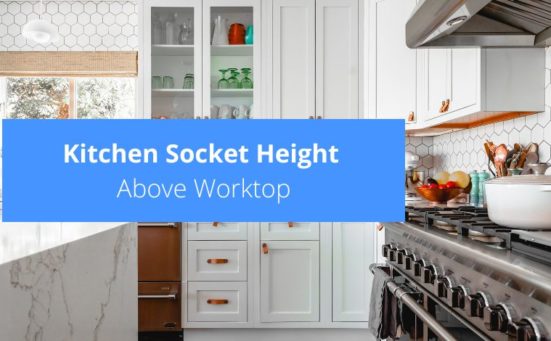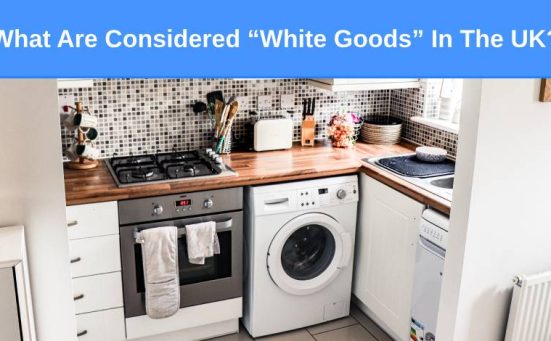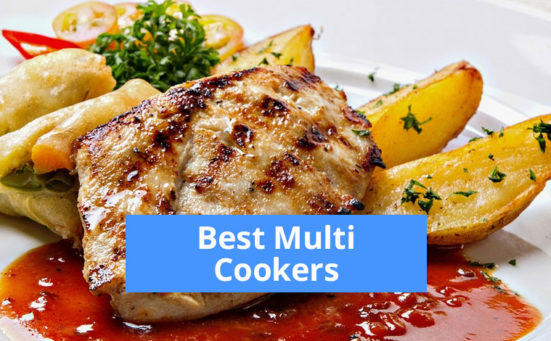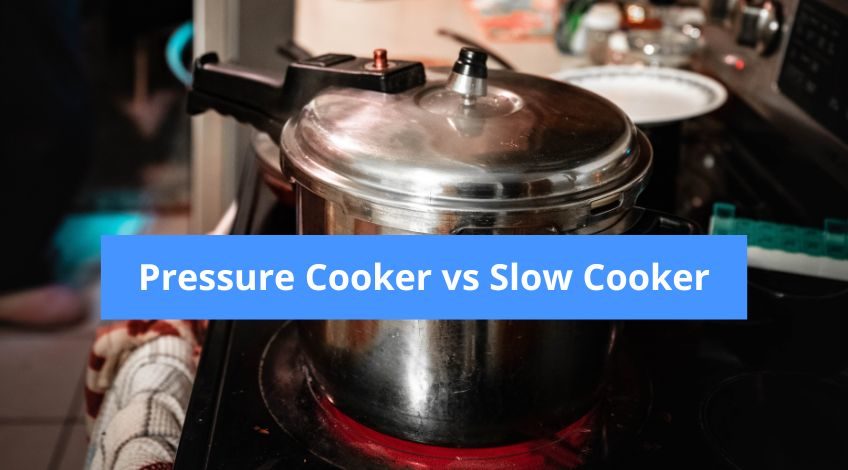 Last Updated: Apr 2024
Last Updated: Apr 2024 Pressure Cooker vs Slow Cooker – Which Is Better?
Many people confuse pressure cookers with slow cookers and vice versa. In this article, we take the lid off both appliances and look into the whys and wherefores of them both. If you’re interested in which appliance is better, the pressure cooker or the slow cooker, keep reading.
What’s The Difference Between A Pressure Cooker And A Slow Cooker?
At first glance, the pressure cooker and the slow cooker look very similar, but they use two totally different ways to cook food.
The pressure cooker uses hot steam and pressure to cook foods faster than many other cooking methods. The slow cooker uses lower temperatures and longer cooking times to slowly and gently cook food.
What Is A Pressure Cooker?
Many of you will remember the large pot on the cooker top hissing steam from the small valve at the top, and threatening to explode in your mum’s kitchen. Modern pressure cookers work in a similar but far more controlled way, are used on the counter top and not the cooker top and are a completely different item to those old pressure cookers of yesteryear.
They work by using a small amount of liquid that is heated to way above boiling point, until it becomes steam. That steam and the pressure cook foods in a far shorter time than any usual saucepan on the cooker top. In many cases ⅓ of the time.
All you need to do is fill the internal pots with food, add the correct amount of liquid, set the temperature, pressure or timer, and wait.
What Are The Pros Of A Pressure Cooker?
The advantages of the pressure cooker include;
- Safe – built-in automatic shut off
- Energy Efficient – pressure cookers use far less (80-90%) energy compared to using a cooker top to cook the same food
- Eco Friendly – Pressure cookers use a very small amount of water to cook and as the pot is sealed you don’t have the option to top it up during cooking
- Fast – pressure cookers use far less time to cook similar foods compared to a cooker top
- Easy to Clean – the internal pots can be removed and washed in a dishwasher
- Nutritious – As the lid is sealed and there is a low water content, there are less nutrients lost during cooking
What Are The Cons Of A Pressure Cooker?
The disadvantages of the pressure cooker include;
- Less Control Over Food – as you cannot remove the lid during cooking, food can become overcooked if left in the pressure cooker for too long
- Safety – there is still the chance, however small, of clogging the valve on the pressure cooker, which could in some rare cases lead to it exploding
- No Fine Touches – as you can’t remove the lid during cooking, there’s no room for tasting and adding any ingredients to adjust the flavour
- All Cooks At The Same Time – as the lid is sealed, there is no room for removing certain items that might cook sooner than the rest
What Is A Slow Cooker?
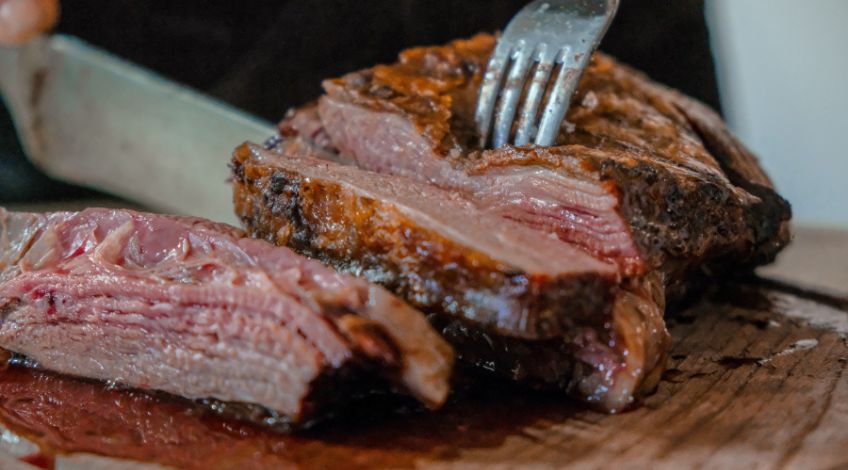
The slow cooker is a countertop appliance that runs on electricity. Slow cookers use low heat and simmer food over a long period of time (between 4 to 8 hours). Often associated with cooking meals like stews and casseroles, the slow cooker can also make roasts, bake bread, make cakes and desserts.
All you do is add liquid, meat and vegetables, set on low and when you return home 8 hours later you will have a hearty, warming meal waiting for you. Or add all of the ingredients and wake up to a freshly baked loaf of bread.
What Are The Pros Of A Slow Cooker?
The advantages of the slow cooker include;
- The Flavours – Slow cooking enhances the flavours in your food
- Tender Meats – even using tough cuts of cheaper meat will be fall off the bone tender when cooked in a slow cooker
- Less Mess – All of the cooking is confined to one pot, no need for pots and pans and frying pans
- Easy To Clean – The inner pot can be washed in a dishwasher
- Energy Efficient – Uses far less energy than cooking on a cooker top
- No Need To Supervise – just fill with ingredients and walk away
- Easy To Operate – it won’t take you long to learn how to get the best from your slow cooker
- Nutritious – because of the low cooking temperatures and slow cooking time, nutrients are retained in the ingredients
- Healthy – due to the low temperature the food is cooked in there is less chance of producing harmful chemicals often associated with frying or fast boiling
What Are The Cons Of A Slow Cooker?
The disadvantages of the slow cooker include;
- Take A Long Time To Cook – there’s no chance of a quick meal from the slow cooker, it will take a minimum of 3 to 4 hours to produce a meal in a slow cooker
- Restricted Recipe Range – there are a limited range of meals that can be cooked using a slow cooker
- There’s No Room For Error – if you make a mistake when preparing your ingredients, your stuck with it
- Some Foods Can Become Too Watery – all meals cooked in a slow cooker will be wetter than those cooked conventionally. This is because of the condensation that accumulates during the cooking process
- Strong Flavours Can Overpower Others – If you use spices or herbs in your cooking, these can become intensified due to the slow cooking process
Which Is Better Pressure Cooker Or Slow Cooker?
The decision as to whether a pressure cooker or a slow cooker is better for you is difficult for us. It depends on your lifestyle and eating habits. If you have a busy lifestyle and are away from home all day, but have time to prepare food before leaving, a slow cooker would probably suit you better. However, if you are more of a last minute sort of person, then, due to its faster cooking times, a pressure cooker would probably suit you more.
Pressure cookers are better for making fast meals, whereas slow cookers are better for leaving on whilst out all day.
Pressure Cooker Vs Slow Cooker Price Comparison

To further assist you in your decision making, here are the average prices of both appliances.
Pressure Cooker Price
Cooker Top
If you decide on using a cooker top pressure cooker these can be bought for anywhere around the £20 to £220 mark depending on capacity, make and model.
Electric Counter Top
Electric counter top models range in price from around £50 to £220 depending on capacity, make and model.
Slow Cooker Price
SLow cookers range in price between around £15 to £100 depending on capacity, make and model.
Should I Buy A Pressure Cooker Or A Slow Cooker?
As they both approach cooking foods in a completely different manner, we suggest you look at the meals you eat and take it from there. If you like to eat plenty of nutritious, comforting stews, casseroles, goulash, etc, then a slow cooker will probably suit you better.
If however you prefer your nutritious meals on the quick, we would advise you buying a pressure cooker. You will have to lay in the preparation work to cook in both but the slow cooker will need to be on for upto 8 hours. Whereas the pressure cooker will take around 20 to 25 minutes to cook.
Frequently Asked Questions
To answer which is better, a slow cooker or a pressure cooker, is difficult as they are totally different appliances. Slow cookers are better for making healthy stews, casseroles etc but they take a minimum of 3 to 4 hours and in some cases 8 hours. Whereas, pressure cookers can cook food in far less time (under 30 minutes). So a pressure cooker will be better if you like your food in a hurry.
The best way to answer whether it is better to slow cook or pressure cook chicken is by comparing the end results. Cooking chicken in a pressure cooker cooks it faster but leaves the meat more stringy. Whereas, the slow cooker takes far longer but leaves the meat far more tender.
You can boil eggs in a pressure cooker, but only if you like hard boiled eggs.
Slow cookers don’t use a lot of electricity. Although the slow cooker is cooking for upto 8 hours, it only uses around 1.3 KWh this is because many are only rated at 200 watts. Which means they use less energy per hour compared to many other appliances.

